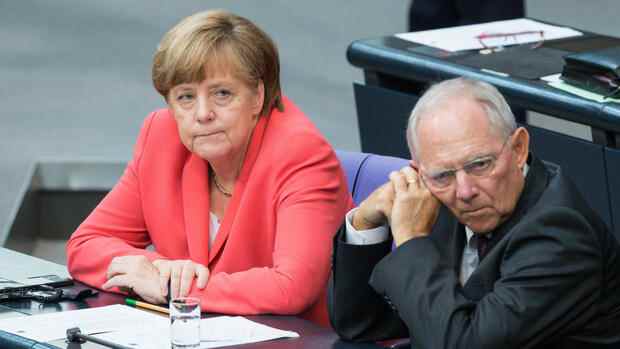Berlin Which image of former Chancellor Angela Merkel (CDU) will remain? Great chancellor or unreasonable politician? About a year after the end of Merkel’s 16-year term in office, the CDU is divided.
At the Young Union’s “Germany Day” in Fulda, Merz demonstratively mentioned the former Chancellor in the same breath as the big CDU Chancellors. In doing so, he indirectly contradicted Schäuble. Adenauer and Kohl had shown leadership, said the party leader: “Angela Merkel took over this leadership in Europe.”
Wüst reiterated that the CDU had no reason to be put on the defensive because of Merkel’s chancellorship.
Merkel has always defended her Russia policy. In June, she publicly commented on this for the first time since the end of her chancellorship. She stuck to her decision to build the Nord Stream 2 Baltic Sea gas pipeline to Russia. “I didn’t believe in change through trade, but in connection through trade, with the second largest nuclear power in the world,” said the CDU politician, who was Chancellor from 2005 to 2021. But it wasn’t an easy decision.
In October, Merkel reiterated that it was right to have relied heavily on cheap natural gas from Russia for a transitional period during the energy transition. “One always acts in the time in which one is,” Merkel campaigned for understanding at an event in the Portuguese capital of Lisbon.
Schäuble does not count Merkel among the great German chancellors
In an interview with the Handelsblatt, ex-Bundestag President Schäuble described it as remarkable that the former chancellor “even now cannot say that we made mistakes in relation to Russia”.
Schäuble himself acknowledged past mistakes in dealing with Russia. When asked if he was angry at himself, he said: “Of course. We didn’t want to see it. That applies to everyone.” He regrets, for example, that he did not listen to the then Polish President Lech Kaczynski. “After Russia’s attack on Georgia, he warned in a speech: First comes Georgia, then Ukraine, then Moldova, then the Baltic states and then Poland. He was right,” says Schäuble.
Schäuble also commented on Merkel’s political legacy. At first he didn’t count Merkel among the great German chancellors, for him they were Konrad Adenauer, Willy Brandt and Helmut Kohl. This list is “complete for the time being,” said Schäuble. “Whether Ms. Merkel will be classified among the great chancellors is perhaps too early to make a conclusive assessment.”
>> Read also: Interview with Wolfgang Schäuble – “Germany’s reputation is badly damaged”
The party leadership said quietly that Schäuble was right in his criticism. Support for his criticism came from the party. The CDU foreign politician Roderich Kiesewetter told the Handelsblatt: “I share Wolfgang Schäuble’s assessment and I would wish that our former Chancellor would implement the security policy change – as it is absolutely necessary in Germany – in her own thinking.” “Self-critical reflection” of Russia policy as well as security policy.
Kiesewetter said that the Russia policy of the past few years had been “quite obviously wrong” and that the wrong conclusions had been drawn from correct assessments – be it from short-term economic considerations or from coalition pressure. “There are never perfect solutions in politics, mistakes are always made, so we should also be lenient,” added Kiesewetter. “But for a forward-looking policy, it is necessary to learn from past mistakes.”
The CDU foreign policy expert, on the other hand, sees Merkel as a “great chancellor” in view of her long tenure and her merits as a crisis manager and also as a mediator in Europe. “However, being great also means being self-critical about your actions and admitting when something was wrong in retrospect,” he said.
CDU leader Merz had already warned the CDU and CSU at the CSU party conference in Augsburg at the end of October against problematizing the reign of the former chancellor. “It’s not the last 16 years that are the problem, the last 16 weeks are the problem,” he said at the time, referring to internal disputes.
SPD criticizes earlier Russia policy more clearly
The Russia debate is much more critical in the SPD than in the CDU. Most recently, party leader Lars Klingbeil surprisingly clearly acknowledged several mistakes in his party. “After the end of the Cold War, the SPD believed that relations with Russia would simply keep getting better,” said Klingbeil in a speech at a party event in Berlin.
This created “blind spots” that led to mistakes in dealing with Russia. Today, on the other hand, it is about organizing security against Russia, which has said goodbye to the common system of values.
Before Klingbeil, Federal President Frank-Walter Steinmeier spoke at the beginning of April about his role in energy policy as head of the Chancellor’s office under Gerhard Schröder and as foreign minister under Merkel and described sticking to Nord Stream 2 as a clear mistake.
“We clung to bridges that Russia no longer believed in and that our partners warned us about.” He was also wrong about Russia’s President Vladimir Putin.
More: How the SPD challenges the CDU with an admission of error in its own Russia policy
